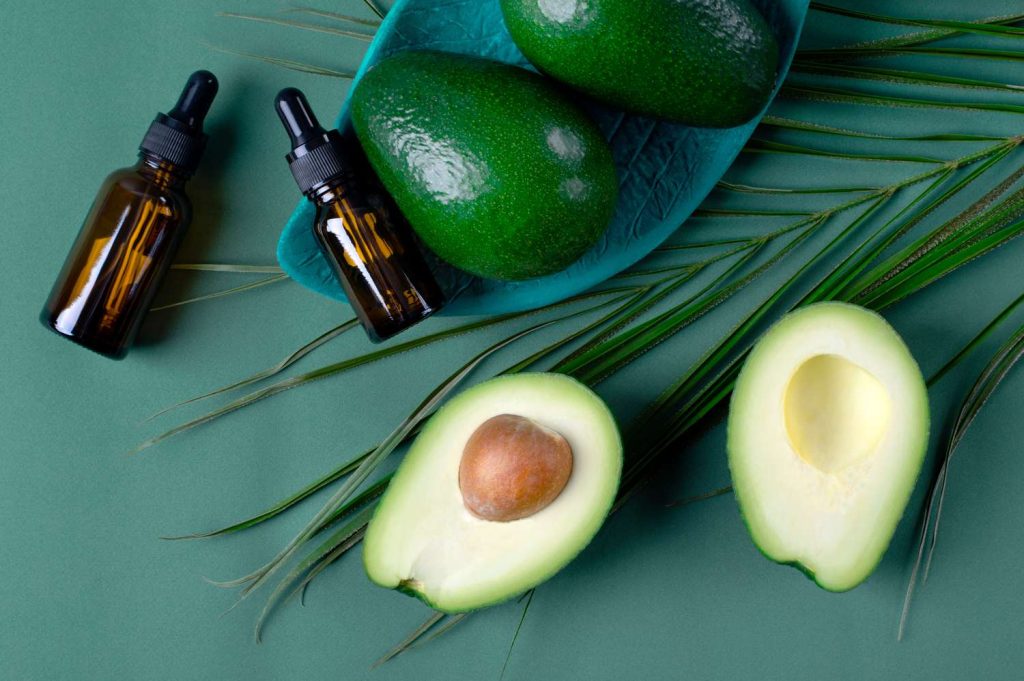Avocado oil has gained popularity in recent years as a versatile and nutrient-rich cooking oil. Extracted from the flesh of avocados, this oil is not only delicious but also packed with health benefits. This article explores Avocado Oil Knowledge, highlighting its nutritional profile, health benefits, culinary uses, and how to incorporate it into your diet.
Nutritional Profile of Avocado Oil

Avocado oil is known for its rich composition of healthy fats and essential nutrients:
- Monounsaturated Fats: Avocado oil is primarily composed of oleic acid, a type of monounsaturated fat that is beneficial for heart health.
- Vitamins: It contains vitamins E, A, and D, which are important for skin health, immune function, and overall well-being.
- Antioxidants: Avocado oil is rich in antioxidants, including lutein and zeaxanthin, which can help protect against oxidative stress and inflammation.
Health Benefits of Avocado Oil
1. Heart Health
Mechanism
The high content of monounsaturated fats in avocado oil can help lower bad cholesterol (LDL) levels while increasing good cholesterol (HDL) levels.
Applications
- Cholesterol Management: Regular consumption of avocado oil can contribute to better heart health and reduce the risk of cardiovascular diseases.
- Blood Pressure Regulation: The anti-inflammatory properties of avocado oil may also help in managing blood pressure levels.
2. Nutrient Absorption
Mechanism
Avocado oil enhances the absorption of fat-soluble vitamins (A, D, E, and K) and other nutrients from foods.
Applications
- Salad Dressings: Using avocado oil in salad dressings can improve the absorption of nutrients from vegetables, making your meals more nutritious.
- Cooking with Vegetables: Pairing avocado oil with cooked or raw vegetables can maximize nutrient intake.
3. Skin Health
Mechanism
The vitamins and antioxidants in avocado oil promote skin health by providing hydration and protection against oxidative damage.
Applications
- Moisturizer: Avocado oil can be used as a natural moisturizer for dry skin, helping to improve skin elasticity and texture.
- Sun Protection: While not a substitute for sunscreen, avocado oil may offer some protection against UV rays due to its antioxidant content.
4. Anti-Inflammatory Properties
Mechanism
Avocado oil contains compounds that have anti-inflammatory effects, which can help reduce inflammation in the body.
Applications
- Chronic Inflammation: Incorporating avocado oil into your diet may help alleviate symptoms of chronic inflammatory conditions, such as arthritis.
- Digestive Health: Its anti-inflammatory properties can also support gut health and reduce digestive discomfort.
5. Weight Management
Mechanism
The healthy fats in avocado oil can promote satiety, helping to control appetite and reduce overall calorie intake.
Applications
- Healthy Cooking: Using avocado oil in cooking can lead to a feeling of fullness, which may help with weight management.
- Balanced Diet: Including avocado oil as part of a balanced diet can support healthy weight loss or maintenance.
Culinary Uses of Avocado Oil
Avocado oil is incredibly versatile and can be used in various culinary applications:
1. Cooking and Sautéing
Avocado oil has a high smoke point (around 520°F or 271°C), making it ideal for high-heat cooking methods such as frying, sautéing, and roasting.
2. Salad Dressings
Drizzle avocado oil over salads or mix it with vinegar and herbs for a delicious and healthy dressing.
3. Baking
Substitute avocado oil for butter or other oils in baking recipes to add moisture and a subtle flavor.
4. Marinades
Use avocado oil as a base for marinades to enhance the flavor of meats, fish, and vegetables.
5. Dipping Oil
Serve avocado oil as a dipping oil for bread or vegetables, possibly mixed with herbs and spices for added flavor.
How to Choose and Store Avocado Oil
1. Quality Matters
- Extra Virgin: Look for high-quality extra virgin avocado oil, which is less processed and retains more nutrients.
- Dark Bottles: Choose oils in dark glass bottles to protect them from light, which can degrade the oil.
2. Storage Tips
- Cool, Dark Place: Store avocado oil in a cool, dark place to maintain its freshness and prevent oxidation.
- Check Expiry Dates: Always check the expiration date to ensure you are using fresh oil.
Potential Health Risks and Considerations
While avocado oil is generally safe for most people, there are a few considerations:
- Allergies: Individuals with avocado allergies should avoid avocado oil.
- Caloric Density: Like all oils, avocado oil is calorie-dense. Moderation is key to avoid excessive calorie intake.
Conclusion
Avocado oil is a nutrient-rich cooking oil that offers numerous health benefits, from supporting heart health to enhancing nutrient absorption and promoting skin health. Understanding Avocado Oil Knowledge allows you to appreciate its versatility and nutritional value.
Incorporating avocado oil into your diet can be a delicious and healthy choice, whether used in cooking, salad dressings, or skincare. Embrace the benefits of avocado oil to enhance your overall health and culinary experience today!
Read Also About Papaya is a delicious tropical fruit that is not only refreshing but also packed with essential nutrients that support overall health. Rich in vitamin C, vitamin A, folate, and antioxidants like beta-carotene, papaya is known for its anti-inflammatory properties and ability to boost immune function.

